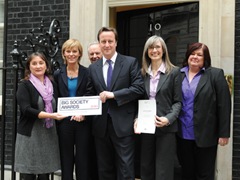A Big Society economy
 Peter Cheney tracks David Cameron’s interest in social enterprise.
Peter Cheney tracks David Cameron’s interest in social enterprise.
Nurses seem an unlikely example of social enterprise but when four of them walked up Downing Street in November, they showed how the sector fits into David Cameron’s thinking about the sector.
Central Surrey Health won the first Big Society Award (pictured above). The organisation, which provides nursing and therapy services to its local area, is co- owned and run by the staff it employs.
“There are some amazing projects and remarkable voluntary work going on in towns and cities up and down the country, by all kinds of organisations from large enterprises to tiny grassroots schemes and inspirational individuals,” he said.
The Prime Minister’s interest in social enterprise goes back well before the recession started. A day after winning the Tory leadership, he launched the party’s social justice policy group at the Eastside Young Leaders’ Academy, a social enterprise in inner city east London.
As agendaNi reported last month (issue 42, pages 108-110), the Big Society is hotly contested. Even at an early stage, there were fears that these words were a cover-up for spending cuts.
Cameron rejected that, saying in November 2006 that he knew “full well” how important funding was but money had to go where it would make the most difference.
The state’s attitude was crucial. Government needed to be more trusting and open to risk: “That way we will avoid the voluntary and social enterprise sectors becoming indistinguishable branches of the state.”
In the following month, he predicted a “revolution” in the UK’s social economy similar to the 1980s revolution in the commercial economy. Social entrepreneurs had the same potential to “transform the most important thing of all, the communities we live in.” The Big Issue was one example.
References in his speeches became more prominent after the financial crisis hit.
“I want social enterprise to be at the heart of our efforts to rebuild our economy and build the better tomorrow I know we can achieve,” he said in February 2009. They would be invited to help run public services, and be paid by the results they achieved. The Coalition’s clearest example has perhaps been using training providers in English and Welsh prisons, to cut re-offending.
David Lidington explored the same themes as Shadow Northern Ireland Secretary. People on the ground, he said in September 2006, understood their communities better than officials in Stormont or Whitehall.
Social enterprise, he said in September 2006, offered government three benefits: outreach to people whom the state could not reach; nurturing personal independence; and commercial discipline. ‘Social enterprise zones’ in the most deprived areas could exempt those companies from some regulations and taxes.
Lidington concluded that a culture in government that “relies on trust rather than on compliance” would deliver better services and also enable “people on the margins of our society to share those dreams of prosperity and happiness which many of us too easily take for granted.”
There is no shortage of sceptics, especially as the cuts approach, but the DUP has also called for voluntary groups to help provide services. It is becoming clearer that the state will have to do more for less and a greater role for social enterprise is one option which Stormont ministers will consider.
Big Society Awards
Nominations can be sent in at any time but the work should be based within the UK. Successful applicants will receive a plaque and be invited to a 10 Downing Street reception. A panel will judge applications every three months.
www.number10.gov.uk/bigsocietyawards





